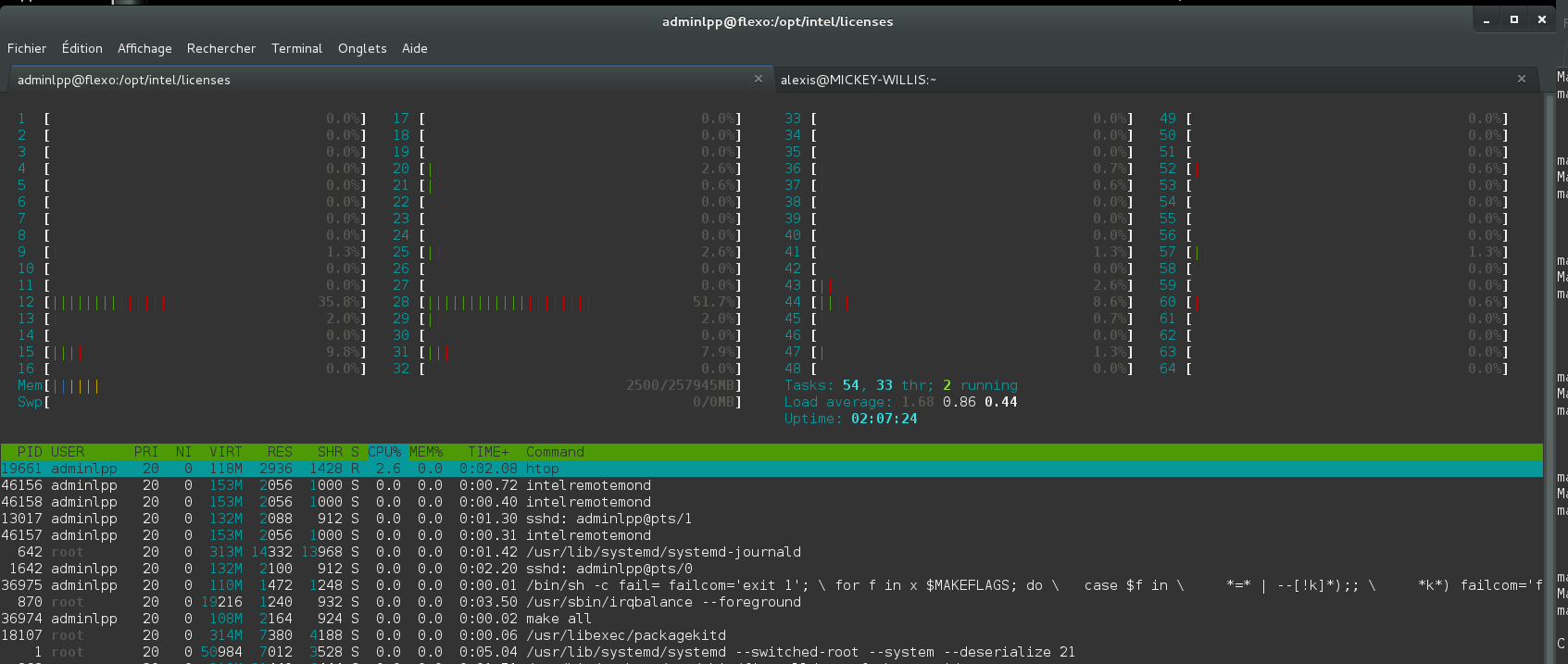
df -h
Will give you something like this:
Sys. de fichiers Taille Utilisé Dispo Uti% Monté sur /dev/sde1 110G 8,1G 97G 8% / devtmpfs 126G 0 126G 0% /dev tmpfs 126G 0 126G 0% /dev/shm tmpfs 126G 920K 126G 1% /run tmpfs 126G 0 126G 0% /sys/fs/cgroup tmpfs 126G 4,0K 126G 1% /tmp /dev/mapper/ddf1_DATA2 15T 7,7G 14T 1% /home
htop
Will give you something like this:

To get more information about htop see here
All process started from ssh are terminated when you close the ssh connection, even if you fork them (./app &). They are closed because when a process is closed the system send the SIGTERM signal to all its children, it’s done to avoid zombies process on a machine. To keep your task alive when you disconnect from ssh, you should use screen (tutorial), it will block the SIGTERM signal. To start your application with screen:
screen # to start screen
./your_app #to start your application or any other command
#type ’ Ctrl-A’ d to leave screen with your application running in background
To reconnect to your previous session:
screen -ls # to list running sessions
screen -r 33287.pts-36.bender # to reconnect to 33287.pts-36.bender session
exit # to close your screen session
Please note that the default mpi distribution on Bender /Flexo /Jakolass is a custom one compiled with intel compiler and libraries, to use the gcc one you should call mpi(cc/f90/run/...) with the full path /usr/lib64/openmpi/bin/mpi(cc/f90/run/...). To run a software compiled with mpi (mpic/cxx/fortran), uses mpirun with -np to set the number of mpi processes you want to start.
mpirun -np 32 /path_to_myapp/myapp
#to run myapp with 32 MPI processes
When you run a software compiled with openMP library, you can tune the number of openMP threads your code will run. To do this you just have to set the OMP_NUM_THREADS environment variable.
export OMP_NUM_THREADS=32
/path_to_myapp/myapp
#to run myapp with 32 openMP threads
killall TheNameOfTheJob
ps ax # will list the running processes
# You can filter, for example if you have started your job with mpi
ps ax | grep mpi
The first number you get is the Process ID
To kill it
kill -9 123456 # if 123456 is your Process ID
To build netCDF with openMPI based on intel compiler, first you have to folow this steps, then:
export CC=mpicc
export F77=mpif77
export F90=mpif90
export FC=mpif90
#export LIBS="-lirc"
export CFLAGS="-fPIC -DgFortran"
export CXXFLAGS="-fPIC -fno-second-underscore -DgFortran"
export FFLAGS="-fPIC -fno-second-underscore -DgFortran"
export F90FLAGS="-fPIC -fno-second-underscore -DgFortran"
export LDFLAGS="-fPIC"
./configure --prefix=/opt/netcdf --disable-shared --disable-dap --enable-f90
make -j 64 # or the number of cores you have
Then to install it, you must do it as super user:
sudo make install
Once installed you need to tell the linker the library path, to do so:
su root #sudo -s on ubuntu
echo "/opt/netcdf/lib" > /etc/ld.so.conf.d/impinetcdf.conf
ldconfig #Tell the linker to update cache
exit #leave root session
To build openMPI with intel compiler:
export CC=icc
export CXX=icpc
export F77=ifort
export F90=ifort
export FC=ifort
export LIBS="-lirc"
./configure
make -j 64 # or the number of cores you have
Then to install it, you must do it as super user:
su root #sudo -s on ubuntu
make install
exit #leave root session
Once installed you need to tell the linker the library path, to do so:
su root #sudo -s on ubuntu
echo "/usr/local/lib" > /etc/ld.so.conf.d/iopenmpi.conf
ldconfig #Tell the linker to update cache
exit #leave root session



Child pages:
Sometime the linux kernell uses a lot of cache memory, it can prevent you from allocating memory in your programs. To solve this issue, one solution is to periodically force the kernell to flush its caches buffers.
mkdir -p /opt/scripts
echo '#!/bin/bash' > /opt/scripts/clearcachemem.sh
echo 'sync; echo 3 > /proc/sys/vm/drop_caches' >> /opt/scripts/clearcachemem.sh
chmod +x /opt/scripts/clearcachemem.sh # make it executable
Then edit cron config with:
sudo crontab -e
# enter insert mode with "i"
# paste "0 0 * * * /opt/scripts/clearcachemem.sh"
# exit with "echap" key then type ":wq" then "return" key
Clonezilla images of compute machines are currently stored in :
\\ibis\Mymac\EquipeInformatique\Images-CloneZilla\